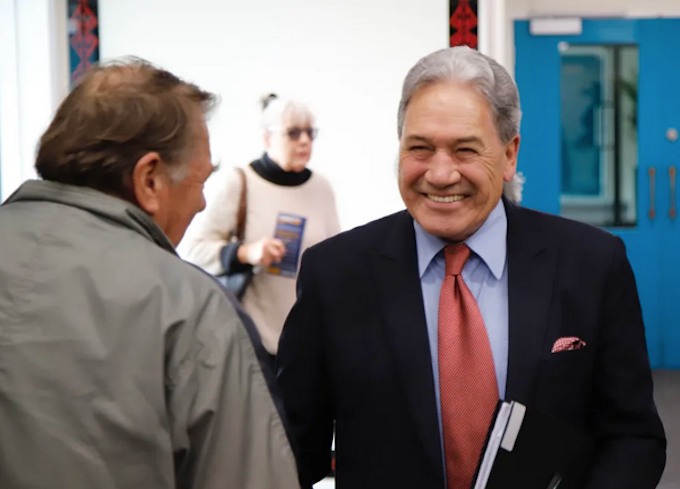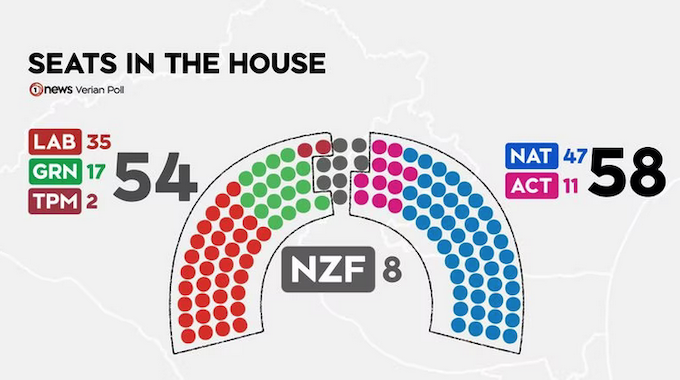
Two polls out tonight both have Winston Peters firmly in the drivers’ seat for forming a government with Aotearoa New Zealand’s general election this Saturday, though the left bloc has increased its overall support.
With 1News and Newshub each releasing their final polls ahead of the election, the trends are showing a last-minute boost for Labour and the Greens — but still far short of forming a government without Winston Peters’ support — which he has vowed not to provide them.
While Newshub’s poll featured a dramatic 4.6-point fall for National, TVNZ’s had National up 1 point but ACT down by the same amount — the right bloc staying steady.
That could be partly explained by the difference in each poll’s survey period: Newshub’s was comparing to numbers from 17 days before, while TVNZ’s poll has been on a weekly release schedule — which makes for smaller shifts in the numbers.
Newshub’s poll also showed a smaller majority for the combined National-ACT-NZ First grouping, with 63 seats, and with trends showing an increase in the left vote, the final days could be crucial.
RNZ political editor Jane Patterson told Checkpoint the rise for the left bloc would be putting the pressure on National.
“Chris Hipkins has of course been talking about that, he said, ‘Look, I feel the momentum, that the left bloc is starting to pick up’ and these polls are starting to show that — however they are not being put in the position where they are in a commanding enough position to form a government.
Second election threats
“If you look at the timeframe, both of them basically covered the weekend . . . that covered the threats of a second election on Sunday from National, it covered Chris Hipkins back on the campaign trail, and obviously a lot of policy debate we know over the tax package.”
She said Labour was also really starting to hone in on the impact of a National government on rental tenants and beneficiaries, “so there’s been a lot of very assertive, aggressive campaigning from Labour against the National Party policy platform”.
Poll mania. Video: RNZ News
Patterson said ACT and NZ First were typically battling each other for voters, and ACT would have been hoping to see their support increase to help consolidate their chances of a two-party government.
“It’s more difficult because of the rhetoric that Chris Luxon has been rolling out about Winston Peters — that tactic has not worked, on these numbers . . . so they could basically cut New Zealand First out he was saying, ‘please, don’t vote for New Zealand First, it’s not going to be good.'”
Despite National doubling down on this by raising the risk of a second election, Peters had remained statesman-like during that time, she said, and NZ First support base were unlikely to like being told what to do.
“The supporters are anti-government, a protest against the government, and not just against Labour — an anti-establishment type vote, so I don’t think that tactic’s worked either.”

Biggest risk
She said the biggest risk to Labour, meanwhile, would be people coming to the conclusion the election result had already been decided.
“I think they’re just going to have to keep carrying on and campaigning until Saturday.”
National also have an advantage, likely to pick up another seat after the Port Waikato by-election in November.
Both had Labour leader Chris Hipkins’ personal popularity also on the rise — but still equal with or just below that of National’s Christopher Luxon. That said, Luxon’s popularity is still well below voters’ preference for his wider party.
This all must be taken with a grain of salt, however.
Individual polls compare their numbers to the most recent poll by the same polling company, as different polls can use different methodologies.
They are intended to track trends in voting preferences, showing a snapshot in time, rather than be a completely accurate predictor of the final election result.
Because of those differences in how they collect and calculate the numbers, which includes revising the calculations to account for demographic differences compared to the wider population (known as ‘weighting’), the different companies’ polls shouldn’t be compared against one another directly.
However, with both showing similar general trends and numbers, it gives a good idea of what voters’ thinking was through to yesterday.
This article is republished under a community partnership agreement with RNZ.













































